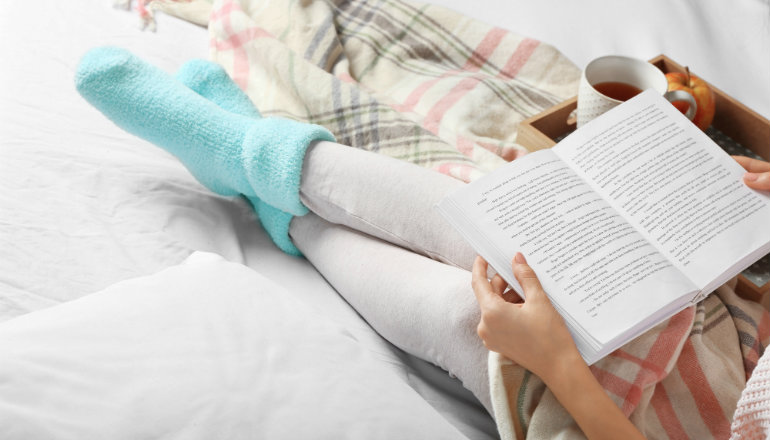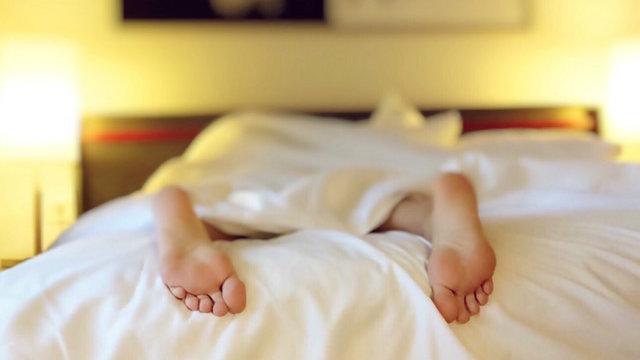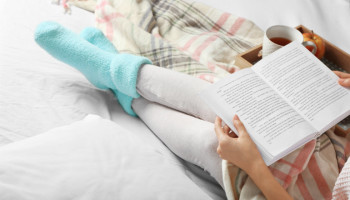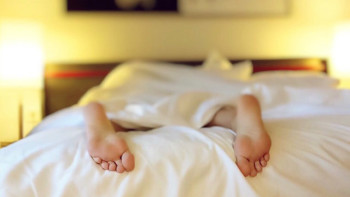 Reading Time: 7 minutes
Reading Time: 7 minutesIt’s easy to stay on track when things are going well. When life is predictable, there’s time to plan meals, exercise, meditate, and get enough sleep.
Unfortunately, life is rarely predictable. Even if your sleep, nutrition, and exercise are on point, you might get sick at some point during the Whole Life Challenge.
This doesn’t mean you have to give up! You may not be able to maintain all of the 7 Daily Habits, but you don’t have to abandon them completely.
Here’s a guide to which of the practices you should absolutely keep following when sick and which you might revise or let go until you feel better.
Exercise
Let’s start with the big one: exercise. Should you exercise when you’re sick?
The answer depends on your illness and the type of exercise you’re planning. Common sense plays a large role here. If you can’t get out of bed, if you’re running a high fever or have a stomach bug with vomiting or diarrhea, or you’re so sick you can’t do even the most basic activities, don’t exercise.
It gets more complicated when you’re well enough to get out of bed and go to work, but don’t feel like yourself.

The general consensus is it’s okay to work out with a mild cold. It’s probably not the best day to set a record pace on your morning run or push yourself to the limit at the gym, but sweating and moving around at a moderate pace is fine. You may find breathing during exercise is more difficult if you are congested, so understand your performance might suffer.
Also, if you’re sneezing and coughing and just generally feeling contagious, you should stay out of the gym — so you don’t risk infecting your workout partners — and exercise outside.
A rule of thumb I heard years ago is the “above the neck” test. If your symptoms are above the neck — congestion, sore throat, or headache — go ahead and work out. If you have symptoms below the neck — including body aches and fever — don’t exercise. For me, coughing is a judgment call. A mild cough won’t keep me from moderate exercise, but when I have a severe cough I’ll usually dial back the exercise even further, taking a leisurely walk or skipping the workout entirely.
If you are suffering from a mild to moderate cold, you may find a workout makes you feel better. Moderate exercise may “prop up your immune response and lesson the duration and severity of a mild infection,” but be careful not to push yourself too hard. A few years ago I had a mild cold and pushed myself to the limit in a CrossFit workout. A few hours later, I spiked a high fever and couldn’t get out of bed. I was fine the next day, but it reminded me to watch my workout intensity when sick.
Nutrition and Hydration
One of the first things to suffer when sick is your appetite. Even though you may not feel hungry, it’s essential to feed your body with quality, whole foods when you aren’t well.
If you’re bedridden with a fever, you might think because you aren’t moving around and burning calories, you don’t need to eat. But even if you spend the entire day in bed, when your body temperature is elevated with a fever, your metabolic rate increases. The old saying, “feed a cold, starve a fever” should actually be “feed a cold, feed a fever.”

When you have a fever, your first concern should be to drink liquids to replace lost fluids. Whether it’s in the form of water or tea, hydration is essential. Next, make sure you continue to eat. You will likely eat less than normal, so it’s imperative to make every meal count. There is some scientific evidence to support the idea that chicken soup can help you reduce upper respiratory symptoms. At the very least, a soup of vegetables and chicken is a healthy, easy-to-eat meal that will keep you hydrated.
It’s also important to eat when you are suffering from a cold. Ingesting calories can help you keep your body temperature elevated, and your body needs energy to fight the illness. As with a fever, you will likely eat less than normal, so make sure to stick with whole, nutritious foods.
Sleep
Sleep, which is essential for good health, becomes even more important when you’re sick. It can be elusive when you’re congested, feverish, or just feeling awful. While some sleep disturbance when sick is normal, you can do some things to mitigate your symptoms.
If you’ve got a bad cold with congestion and a sore throat, a pre-bedtime cup of herbal or decaffeinated tea will help thin mucus, reducing congestion. If you’re participation in the Kickstart level of the Whole Life Challenge, add a teaspoon of honey to your tea to soothe the throat.

If the congestion is severe, you can bring out the big guns: a saline nasal rinse or neti pot. I was suspicious of the entire neti pot procedure until a spate of reoccurring sinus infections sent me to the doctor. She recommended giving the saline rinse a try, and I did find it offered relief. If you are going to go with neti pot route, take the safety precautions seriously. Use distilled or previously boiled water, not water straight from the tap, and clean the bulb syringe, squeeze bottle, or neti pot thoroughly after each use.
If you’re suffering from a sore throat, a nighttime saltwater gargle can help remove the mucus that’s causing the irritation and will cut down on coughing.
A more pleasant way to relieve congestion and soothe a sore throat is a hot shower before bed. The steam from the shower will ease congestion. A humidifier or vaporizer running at night is another way to get relief from nighttime congestion.
Well-Being, Reflection, and Mobilization
When life throws a curve ball, it’s okay to let some things slide. If the Well-Being Practice is “work on a new skill,” and you are unable to get out of bed, then you can pass on that one. If the Well-Being Practice is reading or meditating, you might find it a welcome distraction from your illness. If you feel inspired, you could browse past Well-Being Practices and pick one that would work even when you’re sick.
Mobilization depends on the severity and type of illness. If you can get out of bed but don’t feel well enough to leave the house, a gentle mobilization session could give you a boost of energy and improve your mood. If you’re well enough to record your score, it’s worthwhile to reflect on the status of your health. This is a good way to track your healing progress and see daily improvement.

It’s Not Really About the Points
Of course, the points system doesn’t change just because you’re sick. Just like it doesn’t change if it’s your birthday, you’re moving to a new house, or you’re on vacation. The Whole Life Challenge is really about practicing for your whole life. The ups and downs of life are not exceptions to “the rules.” Learning to navigate illness and adjust your priorities is part of the game.
Remember, above all, be kind to yourself. The Whole Life Challenge is about long, sustained change. A few days or a week off track is no reason to lose hope or give up. Focus your energy on recovery, and pick up the Challenge full force when you’re ready.
Review: WLC Tips for When You’re Sick
- If your illness is above the neck (congestion, headache, sore throat), go ahead and engage in moderate exercise. Don’t push yourself too hard, and be mindful of infecting others at the gym. A walk or slow jog is a great choice.
- If your appetite is diminished, when you do eat, stick with whole, nutritious food. Chicken soup is a great choice. Stay hydrated with water or tea.
- Be proactive about ensuring a good night’s sleep. Relieve congestion with a saline nasal rinse, a steamy shower, or a humidifier. A saltwater gargle can help with a sore throat. If none of these remedies work, over-the-counter medicine can help relieve congestion, but be aware they may make you feel fuzzy-headed the next day.
- Let your body be your guide, be kind to yourself, and focus on recovery so you can get back in the game.










